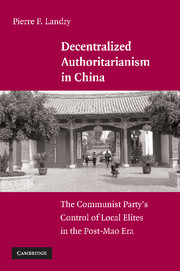 Decentralized Authoritarianism in China
Decentralized Authoritarianism in China Published online by Cambridge University Press: 22 July 2009
Authoritarian regimes that allow political competition at the lowest level of local government do not to so in order to organize their own downfall but because they seek to enhance the legitimacy of the Party and, in turn, extend the duration of their regime. For ruling parties that are threatened by corruption and entrenched local elites, the parsimonious use of the ballot box allows the incorporation of social groups previously excluded from the political system, institutionalizes elite recruitment and rejuvenation, and more generally enhances the responsiveness of the ruling Party to pent-up social demands without risking its hold on national power. The KMT's strategy on Taiwan before 1987 is one of the most successful examples of adaptability to limited and carefully controlled political competition. Even though in the end the ruling party accepted a complete democratization process, the KMT was able to hold onto power for a considerable amount of time, while at the same time holding locally competitive elections.
Since the late 1980's, the Chinese government attempted to rejuvenate grassroots politics and reinforce the legitimacy of the CCP through a series of reforms affecting the recruitment of local leaders. Communist Party functionaries now interact with elected village governments, a configuration of local power that would seem to be at odds with the principal–agent logic that guaranteed tight Party control over government units, as we examined in the previous chapters.
To save this book to your Kindle, first ensure [email protected] is added to your Approved Personal Document E-mail List under your Personal Document Settings on the Manage Your Content and Devices page of your Amazon account. Then enter the ‘name’ part of your Kindle email address below. Find out more about saving to your Kindle.
Note you can select to save to either the @free.kindle.com or @kindle.com variations. ‘@free.kindle.com’ emails are free but can only be saved to your device when it is connected to wi-fi. ‘@kindle.com’ emails can be delivered even when you are not connected to wi-fi, but note that service fees apply.
Find out more about the Kindle Personal Document Service.
To save content items to your account, please confirm that you agree to abide by our usage policies. If this is the first time you use this feature, you will be asked to authorise Cambridge Core to connect with your account. Find out more about saving content to Dropbox.
To save content items to your account, please confirm that you agree to abide by our usage policies. If this is the first time you use this feature, you will be asked to authorise Cambridge Core to connect with your account. Find out more about saving content to Google Drive.